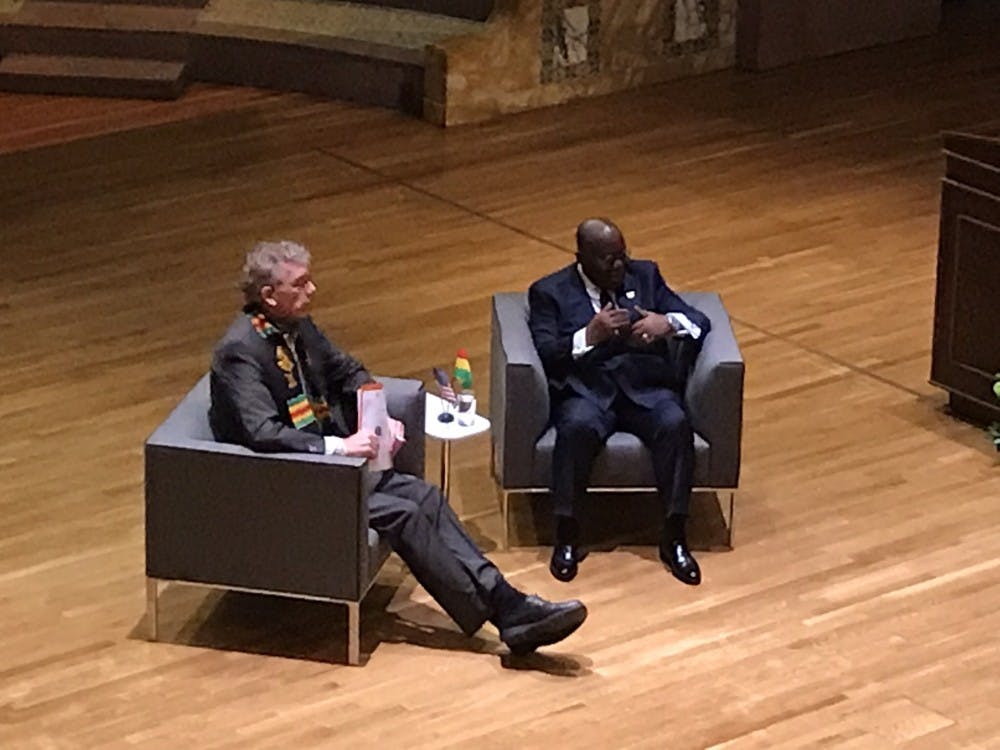Seven of the eight Ivy League institutions boast robust African Studies departments, in which undergraduate students can major. Within the Orange Bubble, such a department does not yet exist, but students and faculty are seeking to rectify this disparity.
Founded in 1975, the University’s Program in African Studies (AFS) is a subsidiary certificate program supported by the Princeton Institute for International and Regional Studies (PIIRS). Currently offering over 20 courses with tracks in the languages of Twi and Swahili, the program is relatively small compared to its geographic counterparts — the East Asian, Latin American, and Near Eastern Studies programs. Unlike peer institutions such as Yale and Harvard, the University’s AFS program is not a full department, and students may only pursue a certificate.
Since its creation, the program has never had its own endowment and relies solely on funding provided by PIIRS. Not all international studies programs depend so fully upon PIIRS, although Emmanuel Kreike, a history professor and the acting AFS director, explained that such a structure was the program’s original goal.
“Twenty years ago, the idea was that all programs in international studies would be under PIIRS,” Kreike said.
Kreike claimed that this arrangement is no longer the case for many programs because they started independently or gained enough support to operate independently of PIIRS. The program in African Studies has not.
The AFS program was also slower than other international studies programs in offering travel abroad opportunities. According to Kreike, the first opportunities abroad for the AFS program were offered in the 1990s, while other PIIRS programs began offering study abroad even before the AFS program began.
In spite of these difficulties, the program has seen significant student-driven and faculty-supported progress towards publicity and exposure. For many years, African Studies has co-sponsored Sankofa, an African fashion show. In April, a team of ambitious students organized the Africa Summit, a two-day conference attracting speakers from the continent and hosting workshops, lectures, and events.
A recent survey of 1,600 randomly-selected students conducted by the Summit’s organizers found that “there is a high level of interest” in Africa on campus.

According to Bunmi Otegbade GS ’19, a Woodrow Wilson School graduate and co-organizer of the Africa Summit, the event was a way to bring increased attention to Africa and to pool together various resources into one conference.
“We wanted to simultaneously amplify the message that Africa is an important region for academic work and scholarly research and professional opportunity,” Otegbade said.
The summit attracted over 200 attendees and hosted 17 invited speakers. Kreike credits the Africa Summit with raising awareness for the AFS program.
“The Africa Summit was fundamental to the successes the program is currently experiencing,” Kreike remarked. “Being able to get a statesman, the President of Ghana, to come speak on campus is monumental.”

The summit’s efforts to bring in African leaders resulted in Ghanaian president Nana Akufo-Addo coming to campus in September, at an event attended by over 600 attendees. According to Bunmi and Blessing Jegede ’21, another Africa Summit co-organizer, the event brought even more credibility and visibility to African Studies on campus.
“It was basically the biggest event the program has had in a long time,” Jegede said.
In addition to student-led events, the AFS program is supporting student research, allowing students to travel to Africa, maintaining its lecture series, and offering classes in Swahili and Twi — all of which comprise its core goals.
According to Kreike, classes in Swahili and Twi are unique, because they are taught by professional language lecturers trained to teach their respective languages — an uncommon feature of programs in African languages.
The program is also modernizing and consolidating the myriad of African-related opportunities and courses available on campus. It has contracted Otegbade to create a new website, similar to those offered by peer institutions, which can list all opportunities to engage with African studies and activities at Princeton.
With future plans to offer innovative faculty-led semesters abroad, Kreike hopes the program will grow substantially.
“My experience is that students vote with their feet,” Kreike said. “There has been tremendous bottom-up support that is helping the program.”
Mouhamed Ndiaye ’22, a member of the African Students Association who has taken three classes in the AFS program since starting at the University, remarked that the program focuses on students’ needs and wants and affords him the chance to engage in increasingly relevant topics in global affairs.
“I know from experience that the program is very student-centered, in that if enough student voices gather around a cause or an event or a course, it will soon become reality,” Ndiaye said. “At the same time, the program is keen on communication between [the] administration and students, as demonstrated by the new initiative, ‘Fridays for Africa,’ which are a series of lunches between Africa-focused student groups and initiatives to dialogue with the AFS program.”
“In addition to being intellectually stimulating, [the program] offers unique opportunities to delve into topics that I feel are important in our global society,” Ndiaye added.
In the near future, there will be an increasing number of African studies classes and events in under-researched topics, such as gender and sexuality in Africa. Additionally, Otegbade believes future iterations of the Africa Summit would benefit from alumni and donor support.
“We hope to bring on more and more people and connect with the alumni,” Otegbade said.
Although the student organizers find the speed of progress frustrating at times, Jegede expressed her own drive to push for long-lasting change.
“What I want to do is make sure I leave Princeton different than before I came here,” Jegede said. “It matters. More can be done.”








